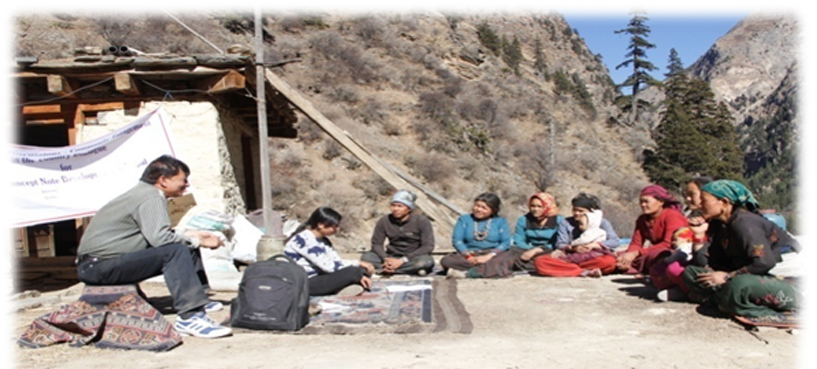Technical Assistance grant for Community Engagement
Technical Assistance Grant (To Provide Technical Assistance for Country Dialogue and Concept Note Development for the Global Fund for Tuberculosis in Nepal)
 (VFDN staff Faciliting Community Engagement Event in Renchi VDC in Dolpa District)
(VFDN staff Faciliting Community Engagement Event in Renchi VDC in Dolpa District)
Highlights of TA in Community Engagement for Tuberculosis
Tuberculosis (TB) remains one of the world's deadliest communicable diseases. In 2013, an estimated 9.0 million people developed TB and 1.5 million died from the disease, 360 000 of whom were HIV-positive. In poor and developing country like Nepal, TB is a major public health problem. About 45 percent of the total population is infected with TB disease of which 60 percent are adult. Every year, 45,000 people develop active TB; out of them 20,580 have infectious pulmonary disease. These 20,000 are able to spread the disease to others. Treatment by Directly Observed Treatment Short course (DOTS) has reduced the number of deaths; however 5,000-7,000 people are still dying per year by TB.2
The descriptive qualitative study was done by conducting Focus Group Discussion (FGD). The study was conducted to find out the current situation of TB care, needs and demands related to the TB services in the community among key affected population, community service providers and related focal person of TB in the districts. The study was conducted in Solukhumbu, Sarlahi, Bhaktapur, Myagdi, Dolpa and Dhangadi covering Kailali, Kanchanpur, Baitadi, Bajhang, Dolpa, Parbat, Baglung, Myagdi, Mustang, Bhaktapur, Sarlahi, Rautahat and Solukhumbu. FGD was also conducted among prison inmates in Nepaljung Jail, Biratnagar Jail and Central jail of Kathmandu. There was active participation of community people during FGD. The collected data were systematically and thoroughly analyzed and interpreted under the basis of stated objectives and findings.
The study shows that all people in the community were known about TB. According to the study, the major promoting factors for seeking health services were the accessibility of health facility and microscopic centers, availability of the medicines in the nearby health facility, health related information regarding TB and other diseases. According to the participants, the major hindering factors were stigma and discrimination prevalent in the community, inaccessibility of health facility due to geographical terrene, lack of family support, carelessness regarding personal health, side effects of TB medicines, microscopic centers are not available in nearby health facilities, health facilities do not open timely, economic barriers and lack of good counseling from health service providers. And in order to improve the quality of TB related services various recommendations had been made like community based awareness program should be conducted, school health and peer to peer program should be introduced, infection control measures should be implemented in MDR and DOTS centre, follow up should be done to patients under DOTS treatment, good counseling should be given to the patients, community and family DOTS should be implemented in all districts, lab test should be available in every health facilities, formation of committee i.e. patients taking DOTS or cured patients should be involved in identifying defaulter cases and medicines should be provided from nearby health facilities. Also various orientation program and training to the community service providers are necessary.
For details, please contact us at info@vfdnepal.org



